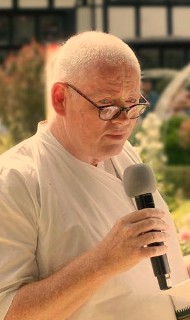adyāpi durnivāraṁ stuti-kanyā bhajati kaumāram
sadbhyo na rocate sā ‘santo ‘py asyai na rocante
adyāpi — even to this day; durnivāram — unavoidable; stuti-kanyā — the girl named stuti (praise); bhajati — remains; kaumāram— unmarried; sadbhyaḥ — by the saintly souls; na — not; rocate — liked; sā — she is; asantaḥ — the non-saintly; api — and; asyai — by her; na — are not; rocante — liked;
“Even to this day, the girl named stuti (praise) remains unavoidably unmarried because the saintly don’t find her attractive and she doesn’t find the non-saintly attractive.”
— Subhāṣita-ratna-bhāṇḍāgāra, Sajjana-praśaṁsā, Verse 123
This verse features a beautiful personification for conveying an important truth. By personifying praise as a nubile damsel who becomes a spinster, it graphically illustrates how the saintly and the non-saintly have opposite attitudes towards it.
In a prospective marriage, if either of the partners doesn’t consent, the marriage can’t take place. Similarly, the marriage of the human heart with praise never materializes – that is, the human heart never finds enduring fulfillment in praise. Why? Because one of the two partners doesn’t consent, as this verse conveys.
Why does praise not like the non-saintly? Because they are ignorant – they don’t know who is actually worthy of praise.
Why do the saintly not like praise? Because they are wise – they know who is truly worthy of praise, Krishna, and also know how praise can divert them from him.
Let’s expand this.
Those who truly love something love it irrespective of the praise they may or may not get for it. In contrast are those who see that thing as a tool to something else such as wealth and prestige. This instrumental view of things can even extend to God wherein religious materialists see him as a tool to worldly good things. And such religious materialists, though better than nonreligious materialists, pale in comparison to the saintly who seek God for God’s sake, for the sake of loving and serving him.
The saintly do not like to be praised because they are aware that whatever praiseworthy ability they have comes from Krishna – it is he who deserves to be praised. When they themselves are praised, they pass on the credit to him and to their spiritual guides by whose mercy they have been able to render some service. They know that praise can infatuate them, thereby distracting them from their life’s ultimate purpose: Krishna. So, though they are eminently praiseworthy, they cultivate humility and stay away from praise as much as possible.
The non-saintly love to be praised because they consider praise life’s greatest success. Being maddened by the craving for praise, they frequently demand or at least expect credit for far more than what is due to them. Often, they consider themselves the sole cause of their success, overlooking the many factors beyond their control that contributed to that success. Even if they sometimes give credit to others, they frequently do so to get further praise for their team spirit.
A question may rise: “This verse says that praise doesn’t like the non-saintly. But such people often receive lavish praise – some movie stars or sports stars have millions of fans.” Yes, but that praise is not actually directed towards them – it is directed towards what they have: their beauty, physique, athleticism or other such external attributes. When they lose those externals with the inexorable passage of time, that praise deserts them. This verse focuses on character development. The praise that the non-saintly receive rarely reflects their core character and it hardly ever improves that character either.
The Bhagavad-gita (13.08) echoes the theme of non-covetousness towards pride by listing amanitvam (the absence of the craving for honor) as the first among the twenty characteristics of knowledge. Srila Prabhupada in his commentary aptly renders this as the freedom from the anxiety to be honored by others. Since Krishna specifies pridelessness as the first in the list of qualities that comprise knowledge, it may well be considered the doorway to the other qualities. If we seekers are consumed by the craving for honor, we can’t learn much – and we certainly can’t absorb ourselves in Krishna.
Of course, we don’t have to become campaigners against praise. We aspire to go beyond infatuation with praise and aversion to praise to absorption in Krishna. If while serving him praise comes of its own accord, we can accept it humbly and gratefully, seeing it as an encouragement for persevering in that area of contribution.
To conclude, people who are praiseworthy don’t like to be praised, whereas people who are not praiseworthy like to be praised.
The post Praise and the praiseworthy (Subhashita commentary) appeared first on The Spiritual Scientist.







 By Bhurijana Dasa
By Bhurijana Dasa


 By Tamohara Das and Anuttama Das
By Tamohara Das and Anuttama Das By Badrinaryana Swami
By Badrinaryana Swami




 By Theresa May
By Theresa May

 By Kripamoya das
By Kripamoya das